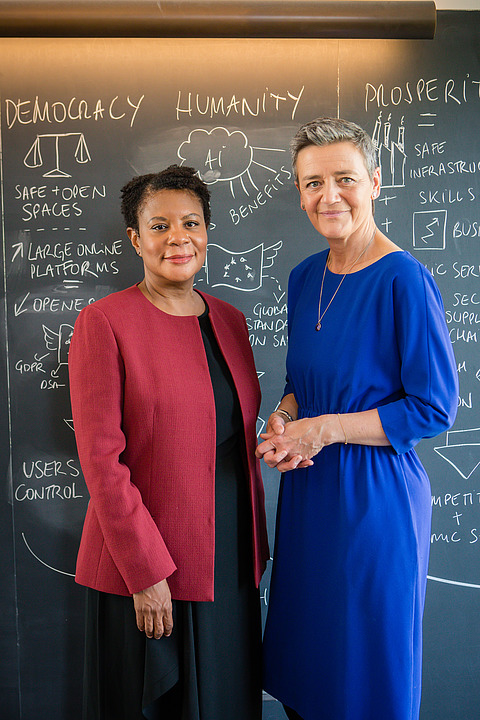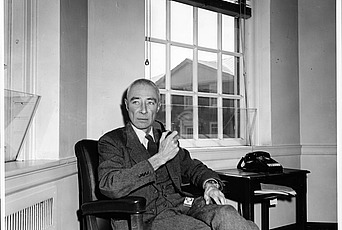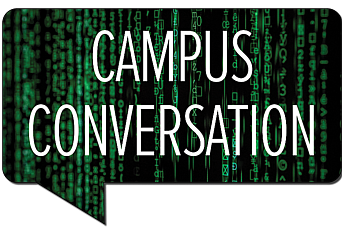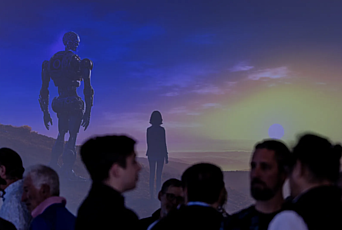"This isn't a new weapon, it is a new world"—Margrethe Vestager delivers the 2024 Public Policy Lecture at IAS
On Tuesday, April 9, 2024, Margrethe Vestager, the Executive Vice President of the European Commission for A Europe Fit for the Digital Age and a leading global voice on technology policy and equitable innovation, delivered the 2024 IAS Public Policy Lecture in Wolfensohn Hall. This annual lecture series is organized by the School of Social Science to address topics in contemporary politics, economics, science, and society.
Vestager's lecture, entitled "This isn't a new weapon, it is a new world"—three things Oppenheimer tells us about tech, focused on lessons that can be drawn from the life and legacy of past IAS Director J. Robert Oppenheimer (1947–66) in the age of large digital platforms and artificial intelligence.
The Executive Vice President began her lecture by highlighting that, in addition to being a scientist, Oppenheimer was a humanist: “one of the first science men to have asserted that technology and humanity can only go together.” She described Oppenheimer’s thinking in this regard as being “very modern […] at a not-so-modern time.”
She went on to state that “before many others, Oppenheimer understood that some technologies do not simply add something to the world. They change it completely. I guess this is what my countryman Niels Bohr means when, in [Christopher Nolan’s Oppenheimer] movie, he tells Oppenheimer: ‘this is not a new weapon, it is a new world.’”
The first lesson that Vestager drew from Oppenheimer concerned platform regulation. She described how online platforms often use sophisticated algorithms to push out content to millions of users “not because it is true or relevant, but because it is emotionally viral.” She argued against the cliché that regulation stifles innovation, instead stating that “laws exist to mitigate the risks, and open up markets that have been closed down.” She provided a run-down of recent European platform regulation initiatives, including the 2018 General Data Protection Regulation, which enacted the right to privacy, and the 2022 Declaration on Digital Rights and Principles, which set out to ensure that the rights that individuals have had for decades in the physical world have equivalents in the digital world.
The second lesson inspired by Oppenheimer was related to artificial intelligence. Vestager asked: “how do we ensure this technology reflects the societies that we want to have, instead of amplifying the flaws, and injustices, of the ones we already have?” She went on to describe how the outline of what would become the first ever worldwide law on artificial intelligence was drawn in Brussels in 2021. She made a comparison between this work and that conducted in the United States by Alondra Nelson, Harold F. Linder Professor in the Institute for Advanced Study’s School of Social Science. Nelson’s efforts saw the White House adopt its blueprint for an AI Bill of Rights in 2022. Vestager concluded this portion of her lecture by highlighting the need for a shared democratic model of AI development and calling for investment in universal AI governance.
The third lesson focused on economic security. Vestager argued that the race to develop and supply the clean technologies that the world needs most, such as wind and solar power, is changing the global economy and jeopardizing economic security. She proposed that “a list of trustworthiness criteria” for clean technology suppliers should be developed, which could include “environmental footprint, labor rights, cybersecurity and data security.”

Vestager concluded by shining a light on Oppenheimer’s characteristic cross-disciplinary approach, exemplified at the Institute for Advanced Study when he hosted artists such as T.S. Eliot and invited historians such as George F. Kennan to join as Members. “Crossing disciplines improves chances of success,” she said. “The excellence and the success of this place proves it a million times. […] Oppenheimer knew that we cannot dissociate technology from the world it was born in. The scientific discovery, from the impact it may have on humanity. How technology is made, from how it should be used.”
The lecture was followed by a Q&A led by Alondra Nelson. After the lecture, Vestager stopped by Rubenstein Commons to sketch out the achievements of ten years of EU tech regulation on one of the ubiquitous IAS blackboards. Visit the IAS Instagram page to watch the video.
The 2024 Public Policy Lecture was funded by an anonymous gift and curated by the School of Social Science.


